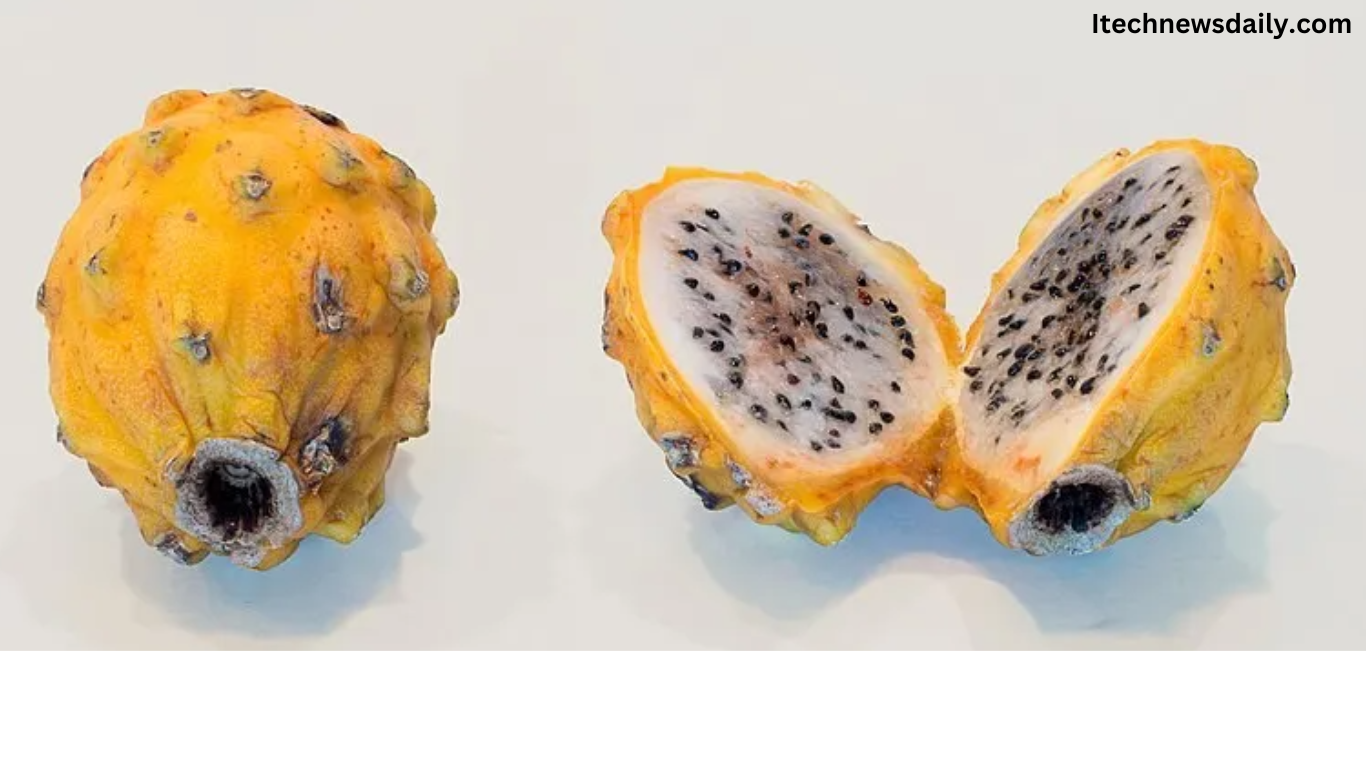
Yellow dragon fruit, also known as pitaya or pitahaya, is a tropical fruit that has gained popularity for its vibrant color, unique appearance, and purported health benefits. Native to Central America, this exotic fruit is now cultivated in various parts of the world.
In recent years, it has become a trendy addition to smoothie bowls, salads, and exotic fruit platters. Beyond its delicious taste and eye-catching appearance, yellow dragon fruit is believed to offer numerous health benefits.
However, like any food, it’s essential to understand both the positive aspects and potential drawbacks. In this comprehensive guide, we will delve into the various aspects of yellow dragon fruit, including its nutritional profile, health benefits, and possible side effects.
Nutritional Profile of Yellow Dragon Fruit
Before exploring the potential health benefits and side effects, it’s crucial to understand the nutritional composition of yellow dragon fruit. This fruit is a rich source of essential nutrients, including vitamins, minerals, and antioxidants. Here’s a breakdown of the keys nutritional components:
-
Vitamins:
-
-
- Vitamin C: Yellow dragon fruit is particularly high in vitamin C, an antioxidant that supports the immune system, promotes skin health, and aids in collagen formation.
- B Vitamins: It contains various B vitamins, including B1 (thiamine), B2 (riboflavin), B3 (niacin), B5 (pantothenic acid), B6 (pyridoxine), and B9 (folate), which play crucial roles in energy metabolism, brain function, and cell division.
-
-
Minerals:
-
-
- Iron: Yellow dragon fruit provides a moderate amount of iron, essential for oxygen transport in the blood and preventing iron-deficiency anemia.
- Magnesium: This mineral is vital for muscle and nerve function, energy production, and maintaining bone health.
- Phosphorus: Important for bone and teeth formation, phosphorus is another mineral found in yellow dragon fruit.
-
-
Antioxidants:
-
-
- Betalains: Yellow dragon fruit contains betalains, which are antioxidants known for their anti-inflammatory and potentially anti-cancer properties.
- Flavonoids: These compounds contribute to the fruit’s antioxidant capacity, protecting cells from oxidative stress.
-
- Dietary Fiber:
-
- Yellow dragon fruit is a good source of dietary fiber, promoting digestive health and aiding in weight management.
Health Benefits of Yellow Dragon Fruit
-
Immune System Support:
-
-
- The high vitamin C content in yellow dragon fruit boosts the immune system, helping the body defend against infections and illnesses.
-
-
Antioxidant Protection:
-
-
- The presence of betalains and flavonoids contributes to the fruit’s antioxidant properties, neutralizing free radicals and reducing oxidative stress.
-
-
Heart Health:
-
-
- The fiber, potassium, and magnesium in yellow dragon fruit may contribute to heart health by lowering blood pressure, reducing cholesterol levels, and supporting overall cardiovascular function.
-
-
Digestive Health:
-
-
- The dietary fiber in yellow dragon fruit promotes healthy digestion, preventing constipation and supporting a balanced gut microbiome.
-
-
Weight Management:
-
-
- The fiber content helps increase feelings of fullness, potentially aiding in weight management by reducing overall calorie intake.
-
-
Skin Health:
-
-
- Vitamin C plays a crucial role in collagen synthesis, contributing to skin elasticity and promoting a healthy complexion.
-
-
Diabetes Management:
-
-
- Some studies suggest that yellow dragon fruit may help regulate blood sugar levels, making it a potentially beneficial addition to the diet for individuals with diabetes.
-
-
Cancer Prevention:
-
- The antioxidants in yellow dragon fruit, particularly betalains, have been studied for their potential anti-cancer properties, although more research is needed to establish conclusive evidence.
Potential Side Effects of Yellow Dragon Fruit
While yellow dragon fruit is generally considered safe for most people when consumed in moderation, there are some potential side effects to be aware of:
- Allergic Reactions:
-
-
- Individuals with allergies to kiwi, pineapple, or other tropical fruits may experience allergic reactions to yellow dragon fruit. It’s advisable to start with small amount to assess tolerance.
-
- Laxative Effect:
-
-
- The high fiber content in yellow dragon fruit may have a mild laxative effect in some individuals, leading to increased bowel movements. It’s essential to stay hydrated to mitigate this potential side effect.
-
- Blood Sugar Levels:
-
-
- While some studies suggest that yellow dragon fruit may help regulate blood sugar levels, individuals with diabetes should monitor their blood sugar closely when incorporating new foods into their diet.
-
- Oxalate Content:
-
-
- Yellow dragon fruit contains oxalates, compounds that can contribute to the formation of kidney stones in susceptible individuals. Those with an history of kidney stones may needs to limit their intake.
-
- Interactions with Medications:
-
- As with any food or supplement, it’s crucial to consider potential interactions with medications. For example, individuals taking medications for blood pressure or blood sugar regulation should consult their healthcare provider before significantly increasing their intake of yellow dragon fruit.
Conclusion
Yellow dragon fruit is not just a visually appealing tropical fruit; it also offers a range of potential health benefits. From immune system support to antioxidant protection and heart health, the nutritional profile of yellow dragon fruit makes it a valuable addition to a balanced diet. However, it’s essential to be aware of potential side effects and exercise moderation, especially for individuals with allergies, kidney issues, or other health concerns.
As with any dietary change, it’s advisable to consult with a healthcare professional or nutritionist before incorporating large quantities of yellow dragon fruit into your diet, especially if you have existing health conditions or are taking medications.
By understanding both the positive aspects and potential drawbacks, individuals can make informed choices about including this exotic fruit in their culinary repertoire while enjoying the delicious and nutritious benefits it has to offer.










